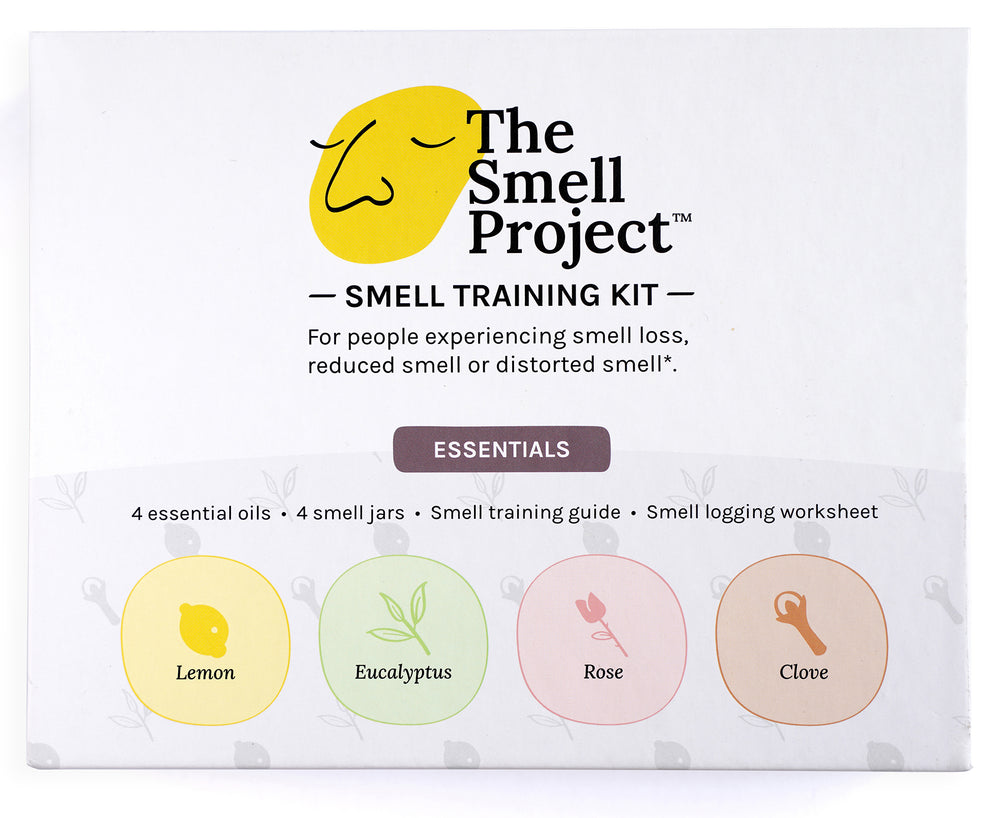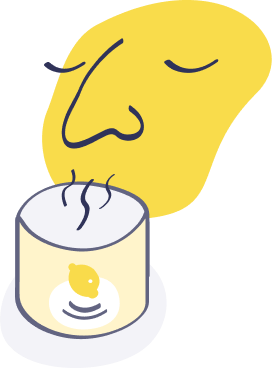Smell Training
Made Easy
Whether you've lost your smell completely (anosmia), have reduced (hyposmia) or distorted (phantosmia) smell, our smell training kit is designed to support daily stimulation of your sense of smell.*
Get My Kit
Need the guide or more logging worksheets?
No problem, simply provide a valid email to download!
The Science of Smell Training
Studies have shown that smell training may support sense of smell. Below is a small selection, we encourage you to do further research.
Olfactory Training Is Helpful in Postinfectious Olfactory Loss: A Randomized, Controlled, Multicenter Study
Study participants went through 18 weeks of training broken into two sections—high and low concentration of smells. The 4 smells used to test were phenylethyl alcohol (rose), eucalyptol (eucalyptus), citronellal (lemon), eugenol (clove) in order to capture what are considered “primary odor categories claimed by Henning.15 For OT (olfactory training).” The study concluded that “Olfactory training is a safe procedure without major side effects, increasing the recovery rates of PIOD (postinfectious olfactory dysfunction), particularly in patients who start OT (olfactory training) within the first 12 months after the onset of the disease.
https://pubmed.ncbi.nlm.nih.gov/23929687/Smell Retraining Therapy for Patients with Olfactory Loss
An enlightening summary of smell training written by Zachary M. Soler, M.D., MSc. The author notes that olfactory loss many affect more people than previously believed. It may also affect five-year mortality rates. He notes that olfactory training has been shown in several randomly controlled studies to show improvements versus placebos. As such, it is being recommended as a way to support your sense of smell for many forms of smell loss, including post-viral, post-traumatic, and idiopathic olfactory dysfunction. The paper notes that training often includes inhaling different odors twice daily for 10 seconds each with short breaks between. This should be continued for a minimum of 3 months or longer especially if the patient shows progress.
Effects of Olfactory Training in Patients with Olfactory Loss
This study starts off by saying that “Recent studies have shown that olfactory disorders occur at a much higher rate than previously assumed” for a variety of reasons, including natural aging. A group of 40 participants were exposed to 4 odors twice daily. Training improved smell scores compared to baseline, supporting the idea that exposure to specific smells over short periods of time may support sense of smell. The author notes that smell training appears to support sense of smell in “patients with olfactory loss due to URTI and idiopathic olfactory loss, but also in patients with functional anosmia following head trauma.
https://pubmed.ncbi.nlm.nih.gov/19235739/FAQ
Yes it is safe. However, because of the high concentration of ingredients in essential oils, it is important to take certain precautions. You should do smell training in moderation only twice a day. And you should never use the oils directly on your skin. Using our smell jars instead of smelling directly from the bottle reduces your direct exposure to essential oils. Seek medical attention immediately if you have an adverse reaction, such as asthma or an allergy.
We recommend storing your oils in a refrigerator to keep them fresh. If you don’t have space in your refrigerator, try placing them in a cool dark place away from sun exposure.
Progress differs greatly between people. Studies have shown that many people see results within 3 months of starting. The longer you stick with it, the better your chances of seeing results.
These odors are the most commonly used in studies because they offer a wide range between scents. In following the latest scientic research, we arrived at these 4 oils.
Our smell jars contain absorbent paper in the lids, allowing oil to be soaked up and released. Because air is what carries odor, having a larger volume inside a jar as compared to a bottle creates a stronger odor when you open a jar. Essential oil bottles are designed to reduce airflow in order to preserve oil, making them non-ideal for smell training. It is also dangerous to place your nose in direct contact with the oil bottles as oils can cause irritation or reactions to skin.


